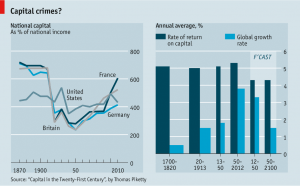Capital In The 21st Century
CAPITAL IN THE 21ST CENTURY
THE FILM.
This film, Capital In The 21st Century is based on the international bestseller by rock-star economist Thomas Piketty (which sold over three million copies worldwide and landed Piketty on Time Magazine‘s list of most influential people).
This captivating documentary is an eye-opening journey through wealth and power, a film that breaks the popular assumption that the accumulation of capital runs hand in hand with social progress, and shines a new light on today’s growing inequalities. Traveling through time, the film assembles accessible pop-culture references coupled with interviews of some of the world’s most influential experts delivering an insightful and empowering journey through the past and into our future.
CAST & CREW.
Directed by Justin Pemberton; Script: Thomas Piketty, Matthew Metcalfe, Justin Pemberton.
Featuring:
| Gillian Tett | … | U.S. Managing Editor, The Financial Times | |
| Ian Bremmer | … | President and Founder, Eurasia Group | |
| Rana Foroohar | … | Associate Editor, Financial Times | |
| Kate Williams | … | Professor of History, University of Reading | |
| Francis Fukuyama | … | Political Scientist | |
| Faisa Shaheen | … | Director of Labor and Social Research Center | |
| Joseph Stiglitz | … | Professor of Economics, Columbia University | |
| Suresh Naidu | … | Professor of Economics, Columbia University | |
| Simon Johnson | … | Former IMF Chief Economist (2007-2008) | |
| Paul Piff | … | Social Psychologist, University of California, Berkeley | |
| Gabriel Zucman | … | Professor of Economics, University of California, Berkeley | |
| Paul Mason | … | British Journalist | |
| Lucas Chancel | … | Co-Director of World Disparity Research Institute | |
| Bryce Edwards | … | Political Scientist |
THE BOOK.
The 2013 book Capital In The 21st Century by French economist Thomas Piketty focuses on wealth and income inequality in Europe and the United States since the 18th century. The central thesis of the book is that inequality is not an accident, but rather a feature of capitalism, and can only be reversed through state interventionism.
The book thus argues that, unless capitalism is reformed, the very democratic order will be threatened. One important indicator of wealth inequality is the ratio of the rate of return on capital (r) versus the rate of economic growth (g) calculated over the long term which historically has been 5% vs .5% over the past 200 years, resulting in an extreme concentration of wealth, and this unequal distribution of wealth causes social and economic instability. Piketty proposes a global system of progressive wealth taxes to help reduce inequality and avoid the vast majority of wealth coming under the control of a tiny minority.
![]()
This work is licensed under a Creative Commons Attribution-NonCommercial-NoDerivatives 4.0 International License
![]()
